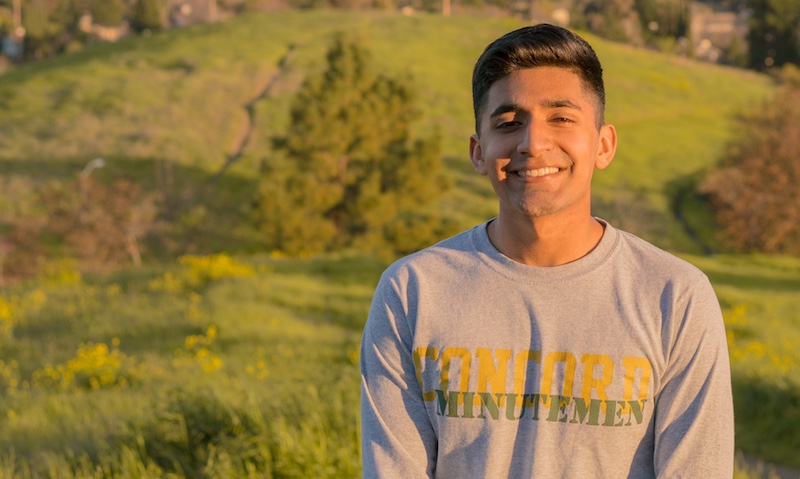 (Eighteen-year-old Aasim Yahya is running for the California State Assembly, District 14. Photo courtesy of Aasim Yahya.)
(Eighteen-year-old Aasim Yahya is running for the California State Assembly, District 14. Photo courtesy of Aasim Yahya.)
Eighteen-year-old Aasim Yahya was just accepted into one of the best public universities in the world, but he plans to sideline his studies for a chance to be a leader in another community – his hometown. Hailing from the San Francisco Bay Area, Yahya recently graduated from Concord High School and is now running for office for the first time in his life.
Yahya is vying for the one open seat on the California State Assembly for his hometown area of District 14 against its current incumbent, Tim Grayson. Yahya, a Democrat, received approximately 16 percent of the votes in the primary election. If Yahya is successful in the midterm election, he plans to take two years off from his new life at the University of California, Berkeley to serve his district.
YR Media correspondent Sarah Belle Lin talked to Yahya about how he plans to tackle important issues in California, from affordable education and environmental safeguards to basic human rights and civic engagement.
The following interview has been edited for clarity and length.
Sarah Belle Lin: Why are you running for California State Assembly?
Aasim Yahya: It all started with the concept of a senior project at Concord High School. Students were supposed to dedicate themselves to a research question and commit 10 hours to a project that explores the research question further. My research question was: What are some of California’s most pressing political and social issues?
My AP Literature teacher, Rebecca Dell, had to approve the project, and one of the things we talked about was running for California State Assembly, which of course would be more than a 10-hour project. In that instance, I knew this was something I naturally gravitated towards. Soon the senior project took a complete backdrop because now I’m running for California State Assembly.
Let’s talk about some of your initiatives. How will you make them a reality? Why are they important?
On Education:
In my opinion, education is the way we are going to start combatting a lot of the social and economic inequality in California and the United States.
One of my mentors and I talked about closing the achievement gap in California. One of the reasons why there is that achievement gap is because we don’t provide any sort of universal preschool. We need to start off students with a universal baseline and give them educational opportunities from the very beginning.
In terms of higher education, I would vote to reduce and oppose any tuition hikes. Tuition is extremely high, whether it’s in a community college or a four-year university like a California State University (CSU) or a University of California (UC). Of course, I would love to push toward universally free higher education, but I just don’t think as a state we are there yet. But if we can stabilize the tuition, and work to gradually reduce it, that would be an ideal situation.
On Environmental Safeguards:
As an Assemblymember, I would seek to ensure that the California Environmental Quality Act (CEQA) is preserved in its current state, as there has been recent opposition seeking to weaken or bypass it. CEQA requires the disclosure of potential environmental impacts of proposed projects. CEQA would help California greenhouse gas emissions be reduced to 1990 levels by 2020. This would prolong the development process, but it’s going to make sure we’re protecting the Californian environment.
In terms of current developments in California, I would oppose the development of the Orcem cement factory in Vallejo, which is in District 14. Truck traffic and pollution will cause health risks for the local community – who are disproportionately Black – while damaging the beauty of the waterfront.
Why is it important to have younger politicians in the California Assembly?
The 18-24 age group is severely underrepresented in the government. If you think about politicians and the government, you think about old, white men. Essentially the image that comes to mind is not reflective of the composition of California or our nation. That brings to question: are the needs of the constituency being met if the representatives can’t necessarily identify with them?
On top of that, the decisions being made now are not necessarily going to affect somebody who is 65 years of age and older. They’re going to impact my generation – the 18-year-olds and the 24-year-olds today.
What are the challenges you face as a young, aspiring politician?
I’m transitioning from high school to college and it’s been extremely difficult trying to find the balance between everything. A lot of people feel that I’m inexperienced but I think that the experience it takes to run for office first requires passion. You have to run with the right motives, have the right intentions while running, love where you come from and want to make it a better place. Whether this campaign ends up in a win or a loss, it’s already a win in so many ways because it promotes youth to become civically engaged.
What would you say to other young people who are considering to run for a political office?
There will be factors and obstacles that are going to attempt to stop you – whether it’s what other people have to say or financial obstacles – but if you find a way to combat those obstacles, just by running you symbolize that you have an important voice in politics and deserve to have your voice heard. You might not be the most knowledgeable or experienced individual running for office, but it’s a great place to start.